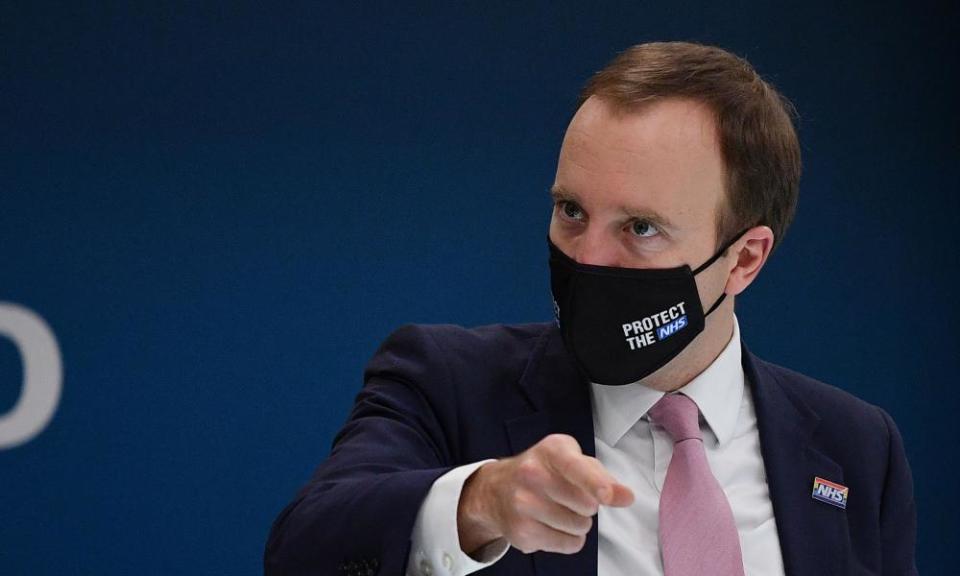Covid testing: does Operation Moonshot have a shot at success?

Operation Moonshot, the government’s mass testing mission to screen millions of asymptomatic people every week, is having a bumpy lift-off.
The project only emerged because of a leak last month and such was the stated ambition – £100bn to deliver 10m tests a day – that MPs laughed when Matt Hancock talked about it in parliament.
They may have had good reason. The existing testing programme was, and still is, struggling to turn around a few hundred thousand tests quickly enough to effectively curb Covid-19.
Some consider the “moonshot” a hopeful vision: it might get workers back to the office, and families could perhaps hug their loved ones again in care homes. To others it is a quixotic distraction to the hard work of fixing a test and trace system overwhelmed by sharply rising infections.
Related: Top medical advisers arguing for tighter coronavirus restrictions in England
Either way, on 16 October, Boris Johnson hit the ignition button, announcing from Downing Street that rapid-turnaround tests would be made available to local directors of public health to help control localised outbreaks. The problem was that directors of public health had not yet been told, the Guardian understands.
As Johnson spoke, officials at NHS Test and Trace gathered as many as possible on a call. It left more questions than answers. Who will pay for staff? How will contacts be traced? Is mass testing even ethical?
Many of the very people the government wants to deliver saliva tests were flummoxed. “I’m going nowhere near it,” said one. “The public expects us to work together better,” said Jim McManus, vice chairman of the Association of Directors of Public Health.
The scale of the shift being proposed is illustrated by Hertfordshire, where McManus is the director of public health. Some 7,600 people are being tested there every week. The moonshot plan to test 10% of the area’s population weekly would require a 16-fold increase.
The parallel testing initiative comes on the eve of a major milestone for NHS Test and Trace and its embattled leader, Dido Harding. The former mobile phone company boss has promised to hit daily capacity of 500,000 tests by Saturday 31 October.
Related: PM admits failings as England's Covid contact-tracing system hits new low
She appears to be on course, with capacity reaching 447,723 on Monday. Whitehall sources say the likelihood of this being achieved has helped NHS Test and Trace fend off calls for a change of leadership from groups including the British Medical Association and Independent Sage, and the Tory chairman of the Commons liaison committee, Bernard Jenkin.
But it obscures the fact that the number of tests being processed is rising more slowly, to 261,855 on Monday. Processing times are getting worse, rising from 28 hours to 45 hours at regional test sites compared with a target of 24 hours. One in five people referred to the system so their contacts can be traced are never reached. A shortage of laboratory capacity is being tackled with the opening of new labs in Newcastle, Bracknell, Newport and Charnwood.
To illustrate the sometimes bizarre issues holding up testing, the Guardian this week learned of a wrangle lasting several days between a council and the Department of Health and Social Care over who should pay for a portable toilet at a mobile testing unit after central government refused.
Now, a crucial question remains: how will the moonshot system and its counterpart work together? NHS Test and Trace insists: “The foundation of our testing offer to the public is, and will continue to be, the provision of diagnostic-level PCR tests for people who have symptoms.”
But the allure of a potentially transformative technology remains strong in Whitehall, where wins have been in short supply in recent months. The saliva tests are seen as “an exciting and important new front in our fight against coronavirus”.
As keen as directors of public health are to innovate, many would be happier if Harding and her team were not aiming for the moon. It would be better, they figure, to fix the system we already have which remains resolutely earthbound.

 Yahoo News
Yahoo News 